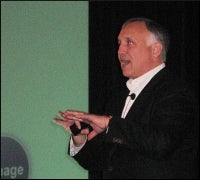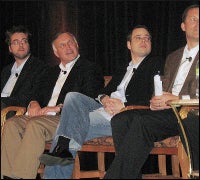 |
| Novell CEO Ron Hovsepian speaks at OSBC. Photo: David Needle. |
SAN FRANCISCO — Most tech suppliers aren’t too happy about the state of the economy. Tighter budgets brought on by the crisis generally means less IT spending. Proponents of open software don’t dispute the challenge, but they argue the current tough times mean there’s more opportunity to pitch the advantages of open solutions.
“The economic forecasts are very sobering,” said Ron Hovsepian, CEO of Linux provider Novell.
But Hovsepian, who spoke here at the Open Source Business Conference (OSBC) on Tuesday, insists Linux and other free, open source solutions are just what companies wrestling with budget constraints should be considering. Open source providers like Novell (NASDAQ: NOVL) make their money on consulting, implementation and support services.
Ninety-two percent of attendees, who participated in a text message survey at a panel after Hovsepian’s keynote, agreed the down economy could be good for open source.
Panelist Marten Mikos, former CEO at mySQL and an outgoing executive at Sun (which purchased the database software last year in a blockbuster billion-dollar deal), was quick to note there are many high-quality open source applications, “but customers buy on low price, so in a recession, open source is that much more attractive both for the applications and the cost of development.”
John Roberts, CEO of SugarCRM, agreed.
“All companies are rethinking the value proposition,” he said. “If you’re a 100-percent proprietary software, it’s difficult to create unique value.”
In another survey of the room, 63 percent chose “lower total cost of ownership” as the most attractive feature of operating system software.
Dries Buytaert, founder of Drupal.org and CTO of Dupal’s chief commercial backer Acquia, said the down economy has certain other benefits for open source software development. “There are plenty of unemployed people willing to work on our project for the experience,” he said, which drew a few chuckles from the audience.
Buytaert said 750 people contributed to the open source Drupal content management software.
Inexpensive but too complex?
Yet adopting open source may not always be as simple as it seems, with panelists here Tuesday debating whether open source software was getting too complex. Fifty-three percent of the audience surveyed agreed with the statement that open source had become more complex than ever, while 27 percent said it was no more complex and 17 said it was less complex.
 (From left) Drupal founder Dries Buytaert, Novell CEO Ron Hovsepian, Mozilla CEO John Lilly and former MySQL CEO Marten Mikos at OSBC. Photo: David Needle. Click to enlarge. |
Roberts said the most basic thing to get right and keep simple is the installation software. “If the installer fails, you are not going to be successful,” he said.
John Lilly, CEO of Mozilla, said open source benefits from a community of users ready to provide support.
Hovsepian, who was also on the panel, said he’s pushed his developers to keep consoles and software operations as simple as possible, like an iPod. “We’ve not made the datacenter as efficient as it could be,” he said.
But Lilly, who said he uses many Apple (NASDAQ: AAPL) products, took some issue with the iPod analogy.
“You should be able to tweak things and make changes to suit your preferences. That’s what we do with Firefox,” he said. “Apple’s products are easy to use, but they work how Steve [Jobs, Apple’s CEO] thinks they should work.”
The netbook opportunity
Hovsepian said he’s especially excited by the growing popularity of devices and appliances that rely on lighter-weight operating systems and cloud computing to perform.
“The cloud is a stepping stone to appliances that let the customer run their applications wherever they need to,” he said.
In particular, he praised the rise of netbooks, which generally can’t handle the overhead of Microsoft’s current Vista operating system, but run Linux (and the older Windows XP) fine. Microsoft’s (NASDAQ: MSFT) forthcoming Windows 7 has lower hardware requirements that let it run on the tiny, low-cost PCs.
Near the end of his keynote, Hovsepian also announced the release of Novell SUSE Linux 11, reported earlier by InternetNews.com. The newer version builds on Novell’s plans to get its flavor of Linux as widely distributed as possible.
Novell is now including a feature called JeOS (Just enough Operating System) that enables developers to include a stripped-down version of the OS in appliances. “This is the beginning of Linux being mass-customized,” Hovsepian said.
He also defended Novell’s ongoing relationship with Microsoft, designed to support interoperability between Windows and Linux.
“When we announced our plans a few years ago, it was very controversial and I understand that,” he said. “But 97 percent of our customers said they planned to keep on using Windows. We have to live with it and embrace what the customers are using.”


